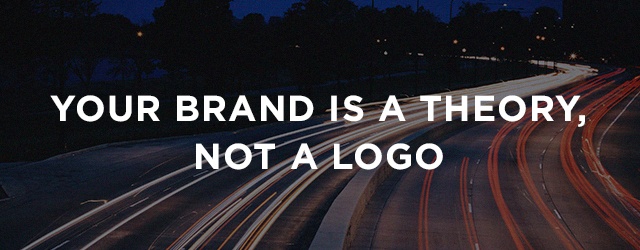Brand Inciter: Your Brand Is A Theory, Not A Logo
by August 5, 2015 10:07 am 238 views

Your brand is a theory, not a logo
Your brand is not real.
That is, it does not exist as a tangible, concrete element.
Your brand is not your logo. It is not your product. It is not your company. Despite the fact that nearly everybody—your executive team, the media, your customers, your employees—may at any given time refer to these things as your brand.
Your brand is not a thing; it is a theory.
Theories are mental constructs — ideas really — designed to describe observable evidence. The best theories match the observed very closely. Some begin as no more than crude approximations and improve as observations become more precise.
The theory of your brand is that there is some aggregate reputational “stuff” accumulated in the minds of your customers and others.
Just as physicists espouse multiple theories about the underlying nature of the universe, brand thinkers have different ways to express a universal truth: your brand is not a thing, it’s an idea. And it’s not your idea; it’s everybody’s.
Some brand theorists say, “Your brand is what other people say when you leave the room.”
Others say, “Your brand is a promise.”
In our practice we say, “Your brand is the sum total of all that is known, thought, said, felt, experienced and perceived about your company, service or product.”
So what can you do with your brand, the theory?
You can study it. Theories get better as evidence is gathered and compared to the theory. Because your brand exists in the minds of your customers and others, you can study it by surveying, interviewing or watching your customers. Ask them what they think, feel and say about your company, product or service. This drives insight into where your brand stands today. We use all manner of studies in our practice; online surveys are readily available and some of the tools are even free. Talk is cheap; you can informally interview customers and prospects yourself or you can hire a research firm to do it in a statistically projectable fashion. Online analytics tools are powerful “microscopes” and the advent of social media has created a huge online cocktail party whose buzz you can mine for brand data.
You can test it. As you articulate your own brand theory, you can test it against your stakeholders. If a physicist theorizes the existence of a subatomic “quark,” he or she then goes looking for it. In brand development exercises with our clients, we often posit one to three draft positioning frameworks that we then test against the customer base. Which is the most relevant and resonant with customers? Which will give us the most leverage in the marketplace? Which is unclaimed by a competitor? Testing your brand theory means validating it initially and monitoring it over time.
You can define it. Sure your brand exists as a mental construct “out there.” But it’s still your responsibility to articulate and define just what that brand is and what it stands for. Otherwise your brand is a cork on the ocean and it will do nothing special to help your organization compete. Theoretical physicists use the language of math to define their theories. You can use plain English. Some great definition tools we advocate include the brand purpose, a statement of why your brand exists and the brand principle, a true north for your brand that serves as a rallying cry for its champions.
You can refine or evolve it. No theory is static. They evolve over time as their authors gather more and more information. No brand is static, either. StubHub just modified its logo to remove the visual reference to ticket stubs—a decision driven by its evolving strategy to broaden its business beyond ticketing. StubHub’s management is working to evolve its brand—and key brand expressions like the logo—so that customers don’t experience a cognitive dissonance between their perceptions and reality. Companies that change faster than their brands can get into all kinds of trouble.
You can evangelize it. Nothing is more powerful than an idea. And since your brand is an idea, one might argue that nothing about our company, product or service is more powerful than its brand. Ideas are spread by evangelists. It’s not happenstance that one of the most powerful, admired and effective brands in the world — Apple — went to market initially with people whose title was “Evangelist.” Guy Kawasaki, now a highly regarded author, speaker and tech-tweeter, was Apple’s first evangelist. While he was making Apple’s brand, Apple made his.
If your brand is a theory, you can’t own it, control it, dictate it, mandate it or command it. But it’s still one of the most powerful ideas you can have for developing, managing and growing your business.
